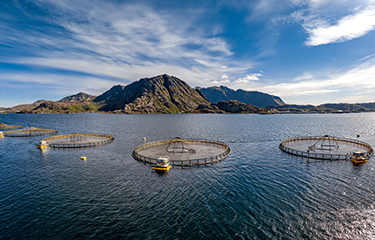Additional cases of infectious salmon anemia (ISA) have cropped up in Norway, along with a case of pancreatic disease. ISA is caused by a virus that is harmless to humans but which can cause mass mortalities at salmon farms as it spreads.
On 26 September, Salmar reported a suspected ISA case at a farm it operates with Veterinærmedisinsk Oppadragssenter in Norway’s Flatanger municipality, in Trøndelag county. The Norwegian Food Safety Authority has undertaken an inspection, and will create a restriction zone limiting marine traffic in a 10- to 20-kilomteter area around the farm if an ISA diagnosis is confirmed. The area was already in an ISA monitoring zone.
On 28 September, the Norwegian authority reaffirmed an ISA restriction zone it previously created covering Trøndelag’s Åfjord and Ørland municipalities after it confirmed the disease was found in a farm operated by Refsnes Laks.
“The purpose of the regulation is to prevent, limit and combat infectious salmon anemia (ILA) in aquaculture animals within the scope of the regulation,” it said. “A restriction zone regulation becomes important for operators who engage in fish farming within a specified sea area, and others who carry out activities that may lead to the spread of infection. The regulations place restrictions on activity in the zones to prevent the spread of infection.”
The authority said it will lift the protection zone when the fish from the facilities in the affected area have been slaughtered, the facilities and equipment cleaned and disinfected, and the zone has been fallowed, according to protocol. The zone is then converted into a new monitoring zone typically maintained for two years.
On 23 August, a suspected ISA case was reported at an area in Alver municipality, in Vestland county, where farms operated by Lingalaks, Landøy Fiskeopdrett, Blom Fiskeopdrett, and Tombre Fiskeanlegg had been raising fish. However, all sites in the area had been emptied of fish as of 15 September, and as a result, the Norwegian Food Safety Authority said it would maintain a monitoring zone in the area rather than covert it to a restricted zone.
A higher-than-normal number of infectious salmon anemia cases have been reported in Norway this year. BarentsWatch, which tracks the presence and spread of aquatic diseases in Norway, lists three ISA restriction zones are currently in place nationwide.
On 22 September, pancreatic disease was detected in a breeding facility operated by LetSea in Alstahaug municipality in Norway’s Nordland county. Pancreatic disease causes salmon to stop eating and growing, and frequently causes high mortalities in areas where it is found, though it remains safe to eat fish with the disease.
In response, a restricted zone with a 30-kilometer radius has been created around the area, where Biomar also operates. And the Norwegian government has informed LetSea it is required to empty its entire facility to avoid further contamination, according to Norwegian Food Safety Authority's Northern Regional Director Geir Arne Ystmark.
“The Norwegian Food Safety Authority takes the PD detection seriously. It is a highly contagious salmon disease that leads to poor health and welfare for the fish, and to great losses for the industry,” Ystmark said. “The location is in an area with other fish farms and in the main area for boat traffic along the coast. In order to limit the spread of infection, we will order a rapid emptying of the facility.”
The authority has begun additional testing around the area, to be paid for by LetSea. The Sandnessjøen, Nordland-based firm said it had hired the Norwegian Gannet, a floating harvester, to cull its 860,000 fish in the Ystøya location, which it said weighed an average of 2.6 kilograms each.
"PD is a serious and unwanted disease. LetSea takes monthly samples of the fish, and while the samples taken in August showed a healthy fish, there were results for PD on the sample for September," it said on LinkedIn. "This is a very regrettable situation, and we are now working closely with the authorities and are carrying out culling of the fish and measures to avoid the spread of infection."
Photo courtesy of Andrei Armiagov/Shutterstock







